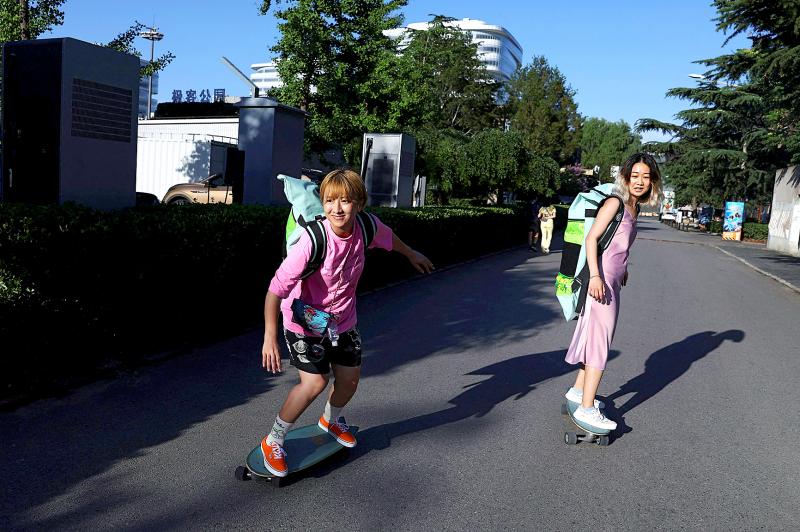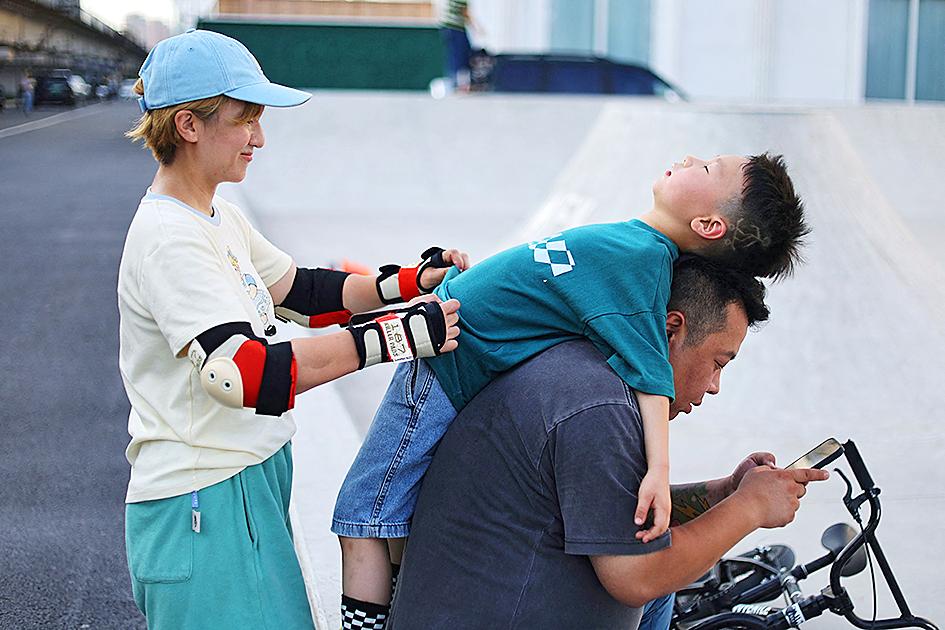Feeling cooped up by the Chinese capital’s partial COVID-19 lockdown earlier this year, which shut gyms, parks and other venues, Beijing resident Mina Zhao came across surfskating on social media and decided to give it a try.
Zhao, 40, who loves to ski, was an instant devotee, getting her husband and son involved in surfskating and even introducing it to dozens of fellow mothers who have gone on to buy their own boards.
“I think for my work, even for my life, skateboarding is having a positive effect,” Zhao said, adding that it has helped her lose weight and reduce anxiety over her child’s education.

Photo: Reuters
Surfskating, a novice-friendly version of skateboarding that uses a more flexible front-end wheel assembly, known as a truck, to enable deeply carved turns akin to surfing, has taken off in Chinese cities since the spring, especially among women.
Zhao said surfskating gives her a sense of accomplishment, and the positive energy she gets from it emboldened her to spend time away from home, wear more colorful clothing and even dye her hair to a lighter shade for the first time.
“Through this sport, what we want to explore more is ourselves. Being ourselves is more important than the world’s stereotypical view of us,” she said.

Photo: Reuters
She said it also has a calming effect.
“The more anxious you are, the worse it is for your child. Sometimes I just skate around the basement, I feel like a man who has a couple of cigarettes outside when something happens,” Zhao said.
Considered easier to learn and less prone to wipeouts than other forms of skateboarding, surfskating also got a boost from the buzz over snow sports in China this year as Beijing hosted the 2022 Winter Olympics.

Photo: Reuters
A surfskater can carve snowboard-style turns without the need for snow or even a slope.
Clubs, networks and group classes have proliferated.
One free weekly session for women near Beijing’s landmark National Aquatics Center, or Water Cube, has grown from around a dozen regulars in late April to nearly a hundred, according to its organizer, a professional dancer named Duo Lan.
Zhao, who organizes children’s activities and first tried surfskating in May, when she was unable to host events due to the lockdown, is one of her older students.
BEACH FEELING
Chen Yanni, 29, also tried surfskating to escape lockdown after seeing the sport on her social media feeds.
She was quickly hooked.
“You feel so free,” said Chen, who works in IT.
“And then there’s this sense that I am approaching 30 but I feel very young all of a sudden. I love this feeling. It’s like being a teenager again,” she said.
Chinese online searches for skateboarding, and surfskating in particular, have soared. Xiaohongshu, a shopping and lifestyle recommendations app, says searches for “lu chong”, which translates to “land surfboard”, rose by 50 times in June from a year earlier.
E-commerce giant JD.com reported 80 percent growth in surfskateboard sales last month, compared with the same period last year.
At one of “Burning Ice” skateboard shop’s five Beijing branches, revenues were up around 300 percent this year, according to a store manager who declined to be named.
Surfskateboards at the store, which range in price from around 400 yuan (US$60) to more than 4,000 yuan, make up around 50 percent of the increase, he said. Women account for around 70 percent of the stores sales.
Some said they took up the sport as a hobby when COVID made summer travel difficult.
“I have the feeling that I have returned to the beach,” said Yoyo, 34, a finance professional, part-time diving coach and surfer, who had been glum over the lockdown.
“It’s hot in the summer, but I have the wind in my hair and I feel free.”

In the March 9 edition of the Taipei Times a piece by Ninon Godefroy ran with the headine “The quiet, gentle rhythm of Taiwan.” It started with the line “Taiwan is a small, humble place. There is no Eiffel Tower, no pyramids — no singular attraction that draws the world’s attention.” I laughed out loud at that. This was out of no disrespect for the author or the piece, which made some interesting analogies and good points about how both Din Tai Fung’s and Taiwan Semiconductor Manufacturing Co’s (TSMC, 台積電) meticulous attention to detail and quality are not quite up to

April 21 to April 27 Hsieh Er’s (謝娥) political fortunes were rising fast after she got out of jail and joined the Chinese Nationalist Party (KMT) in December 1945. Not only did she hold key positions in various committees, she was elected the only woman on the Taipei City Council and headed to Nanjing in 1946 as the sole Taiwanese female representative to the National Constituent Assembly. With the support of first lady Soong May-ling (宋美齡), she started the Taipei Women’s Association and Taiwan Provincial Women’s Association, where she

It is one of the more remarkable facts of Taiwan history that it was never occupied or claimed by any of the numerous kingdoms of southern China — Han or otherwise — that lay just across the water from it. None of their brilliant ministers ever discovered that Taiwan was a “core interest” of the state whose annexation was “inevitable.” As Paul Kua notes in an excellent monograph laying out how the Portuguese gave Taiwan the name “Formosa,” the first Europeans to express an interest in occupying Taiwan were the Spanish. Tonio Andrade in his seminal work, How Taiwan Became Chinese,

Mongolian influencer Anudari Daarya looks effortlessly glamorous and carefree in her social media posts — but the classically trained pianist’s road to acceptance as a transgender artist has been anything but easy. She is one of a growing number of Mongolian LGBTQ youth challenging stereotypes and fighting for acceptance through media representation in the socially conservative country. LGBTQ Mongolians often hide their identities from their employers and colleagues for fear of discrimination, with a survey by the non-profit LGBT Centre Mongolia showing that only 20 percent of people felt comfortable coming out at work. Daarya, 25, said she has faced discrimination since she